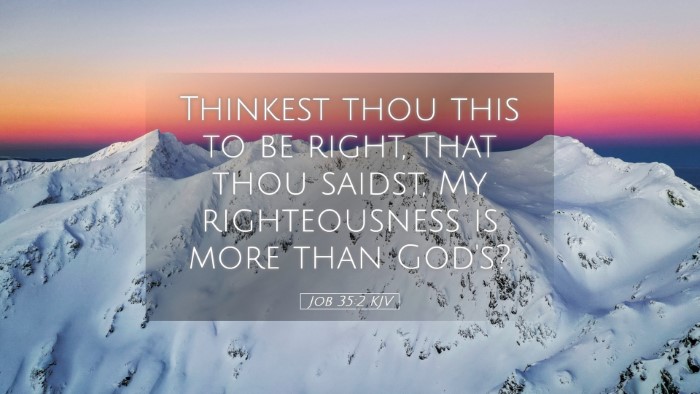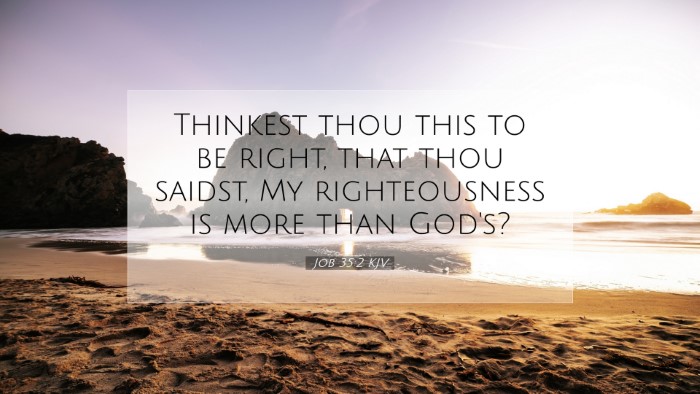Old Testament
Genesis Exodus Leviticus Numbers Deuteronomy Joshua Judges Ruth 1 Samuel 2 Samuel 1 Kings 2 Kings 1 Chronicles 2 Chronicles Ezra Nehemiah Esther Job Psalms Proverbs Ecclesiastes Song of Solomon Isaiah Jeremiah Lamentations Ezekiel Daniel Hosea Joel Amos Obadiah Jonah Micah Nahum Habakkuk Zephaniah Haggai Zechariah MalachiJob 35:2
Job 35:2 KJV
Thinkest thou this to be right, that thou saidst, My righteousness is more than God's?
Job 35:2 Bible Commentary
Commentary on Job 35:2
Job 35:2 states: "Do you think this to be right? Do you say, ‘My righteousness is more than God’s’?" This verse is central to understanding Elihu’s discourse in the book of Job, as it captures the essence of the human tendency to challenge God's justice and authority.
Contextual Background
Job, a man described as blameless and upright, finds himself in a position of immense suffering and despair. His friends’ attempts to rationalize his plight through a simplistic understanding of divine retribution lead to further confusion and frustration for Job. It is in this backdrop that Elihu, a younger observer, steps in to offer his perspective.
The larger discourse revolves around the nature of God’s justice and righteousness. Elihu questions Job’s assertions that God is unfair in permitting his suffering, which illuminates key themes in the book of Job: the sovereignty of God, human righteousness, and the relationship between suffering and sin.
Elihu’s Challenge
In this verse, Elihu presents a rhetorical question that is both confrontational and illuminating. He asks, "Do you think this to be right?" This question serves to provoke Job into reconsidering his position. Elihu implies that Job’s understanding of righteousness and the divine order is flawed.
According to Matthew Henry, Elihu indicates that Job's complaints may arise not from a proper understanding of God but from an inflated view of his own righteousness. Henry emphasizes that Job, in his distress, may place unjust blame on God, insisting that his own integrity surpasses God’s justice.
Albert Barnes echoes this sentiment, noting the danger of human beings attempting to equate their own sense of righteousness with divine standards. Barnes elaborates that this mindset leads to a spiritual pride, a common pitfall for believers who assume that personal virtue can somehow compel God to act according to their expectations.
The Nature of Human Righteousness
Elihu's inquiry demands a recognition of the infinite chasm between God's holiness and human righteousness. Adam Clarke notes that human righteousness, no matter how sincere, is always insufficient when measured against God's absolute perfection.
This theme is critical, as it compels both Job and the reader to consider the limitations of purely human understanding in the face of divine wisdom. Clarke’s commentary emphasizes that believers are often quick to judge God based on their limited experiences and understanding of right and wrong.
- Human Perspective: Job’s assertion of righteousness represents a flawed human perspective that seeks to define justice.
- Divine Perspective: God’s ways are higher than human ways, which Elihu seeks to remind Job of throughout his speech.
Interpretive Reflections
Job 35:2 invites deeper theological reflection, especially in its implications for contemporary Christian ethics and morality. When Elihu challenges Job’s view of righteousness, he raises questions about the nature of justice in the world.
This moment serves as a reminder for modern believers: righteous living must not be equated with self-righteousness. Theological educators and pastors often use this text in teaching contexts to illustrate the necessity of humility before God’s sovereignty.
According to Matthew Henry, it is essential for believers to maintain a perspective that recognizes human limitations in comprehending divine motives. Acknowledging the supremacy of God’s will amidst suffering cultivates a deeper faith that trusts in God's ultimate justice.
Conclusion
Job 35:2 encapsulates a profound theological challenge that echoes throughout the ages. The interplay between human righteousness and divine justice continues to resonate with contemporary readers. Elihu’s words remind us that our understanding of righteousness must be grounded in the character of God rather than our subjective experiences.
In conclusion, Elihu’s challenge serves as a necessary corrective, urging believers to reassess their views on justice, righteousness, and the nature of suffering. As we examine this text, let us strive for a balanced understanding of our relationship with the divine—recognizing God’s sovereignty while also acknowledging our human frailty.


